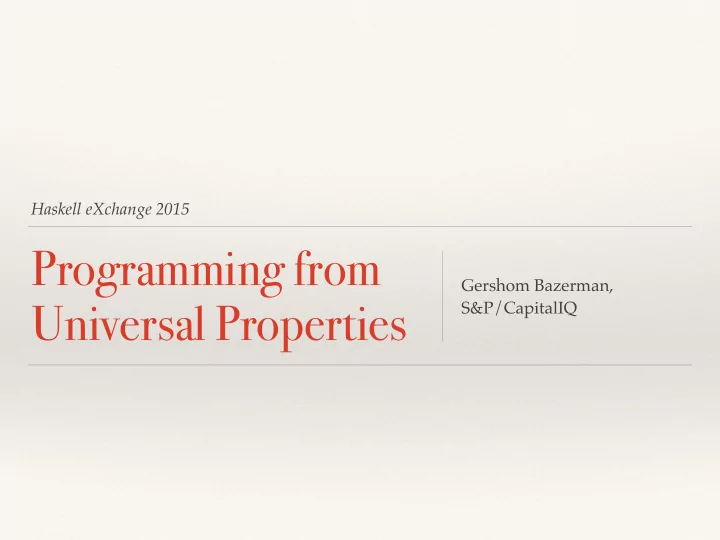

Haskell eXchange 2015 Programming from Gershom Bazerman, Universal Properties S&P/CapitalIQ
Warning: This Talk Contains Lies
What is a Universal Property ❖ Take some notion of a “mathematical object” and define some notion of something (or things) one can do with it. That’s a property! ❖ Why is “color” a property of a wheelbarrow? Because there is a function Wheelbarrow -> Color.
What is a Universal Property Categorically
What is a Universal Property ❖ A universal property of an object is still something you can do with it, but it something you can do with it that encompasses everything you can do with it. ❖ The universal property of Bool is `a -> a -> a`. ❖ We capture the “essence” of Bool without direct reference to Bool.
What is a Universal Property Categorically (Ok, only a special case)
1) A Diagram
2) A Co-Cone
3) A Universal Co-Cone; i.e. A Colimit
Varieties of Colimits ❖ N discrete objects — N-ary Coproduct (Either). ❖ 0 discrete objects — Initial Object (Void). newtype Void = Void Void absurd :: Void -> a absurd (Void a) = absurd a
Varieties of Colimits ❖ Two objects, parallel morphisms — Coequalizer (Must factor through the parallel morphisms)
Varieties of Colimits ❖ Two objects, parallel morphisms — Coequalizer
Some Coequalizers ❖ Objects are Sets, Morphisms are Set-theoretic functions Coequalizers are quotients — i.e. f, g : A -> B then Coeq(f,g) ~= [ f(x) | x <- a, f(x)=g(x)] + [(f(x),g(x)) | x <- a, f(x) /= g(x)] (sort of)
Some Coequalizers ❖ Take Matr_Int — objects, given by N, are sets of all NxN matrices, morphisms are NxM matrices that act by multiplication and we have a zero object. Coeq(M,0) is the cokernel — aka the left null space. I.e. x such that x*M = 0. ❖ http://blog.functorial.com/posts/2012-02-19-What-If- Haskell-Had-Equalizers.html
Some Coequalizers ❖ Topologically
Parallel arrows on the same object ❖ Object with a loop and a constant arrow. (Result of Freyd) Nat!
Varieties of Colimits ❖ Three objects in a span — Pushout
Cocompleteness ❖ Coproducts & Equalizers —> Pushouts ❖ Pushouts & Initial Object —> Coproducts & Equalizers ❖ either of these —> “All Finite Colimits”; i.e. co-complete
Categories to Haskell data ConeOverTwo a b t = CoT (a -> t) (b -> t) data Colim f = Colim (forall t. f t -> t) -- Colim (ConeOverTwo a b) === Either data ConeOverZero t = CoZ -- Colim ConeOverZero === Void
Universal Properties from Universal Quantification! data ConeOverTwo a b t = CoT (a -> t) (b -> t) data Colim f = Colim (forall t. f t -> t) {- either :: Either a b -> (a -> c) -> (b -> c) -> c either2 :: Colim (ConeOverTwo a b) -> (a -> c) -> (b -> c) -> c either2 (Colim h) f g = h (CoT f g) Exercise — work the isomorphism through by hand. -}
Why does this work!? Types of \x -> x forall a. a -> a Num a => a -> a String -> String () -> () Double -> Double Int -> Int Universally Quantified Types are Initial Types Even -> Even
Categories In Haskell Nat data ConeOverLoop t = CoL (t -> t) t type Nat = Colim ConeOverLoop fromN :: Nat -> Int fromN (Colim f) = f (CoL succ 0) toN :: Int -> Nat toN n = Colim (\(CoL s z) -> last $ take (n+1) $ iterate s z) Colimits ~= Initial Algebras ~= Church Encodings Data ~= Functions
Whoa List a data IndexedConeOverLoop a t = ICoL (a -> t -> t) t type List a = Colim (IndexedConeOverLoop a) fromList :: List a -> [a] fromList (Colim f) = f (ICoL (:) []) toList :: [a] -> List a toList xs = Colim (\(ICoL c z) -> foldr c z xs)
In Fact… Void F Void F (F Void)
In Fact… Void F Void F (F Void) Adamek’s Theorem: Fix F Under certain conditions (F is co-continuous, etc) then: The colimit of the chain induced by iteration of F is the initial F algebra.
Thinking with Universal Properties ❖ Date recurrence rules (calendar appointments, meeting schedules, scheduled batch procedures and reports, scheduled bond payments) ❖ data Sched = Daily | Weekly [1-7] | MonthlyAbsolute [1-31] | MonthlyRelative [1-7] [1-4] | JointSchedule Sched Sched | … ❖ interpSched :: Sched -> Day -> Day ❖ interpSched :: Sched -> Day -> Nat ❖ type GenSched = (Day -> Nat) ❖ data GenSched = GenSched (Day -> Maybe (Nat, GenSched))
Thinking with Universal Properties ❖ data GenSched = GenSched (Day -> Maybe (Nat, GenSched)) ❖ data GenSched a = GenSched (a -> Maybe (Nat, GenSched a)) ❖ … by universal nonsense … ❖ type GenSched a = a -> [Nat] ❖ A universal schedule representation.
Clojure’s Transducers ❖ type Reducer a = forall z. (a -> z -> z) ❖ type Transducer a b = forall z. (a -> z -> z) -> (b -> z -> z) ❖ … By abstract nonsense ❖ Transducer a b === b -> [a] ❖ ( https://oleksandrmanzyuk.wordpress.com/2014/08/09/transducers-are-monoid- homomorphisms/ http://tel.github.io/posts/typing-transducers/)
Just One More Thing… ❖ Take some category C, now look at “things ‘containing’ C but that have all colimits.” Now take the initial such thing… what is it? The Yoneda Embedding
Extreme Haskell Take it to the (co-)Limit!
Recommend
More recommend